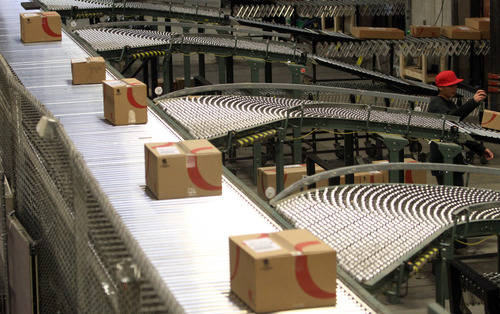This is an archived article that was published on sltrib.com in 2013, and information in the article may be outdated. It is provided only for personal research purposes and may not be reprinted.
Washington • Utah is missing out on $180 million in sales tax revenue annually through online purchases, although Senate legislation under debate could force Internet retailers to collect the tax from consumers.
The proposed change, which the Senate could vote on Wednesday, would affect Internet retailers who do more than $1 million in business a year, and has Utah business officials and elected leaders split over whether it would be good for the state.
Gov. Gary Herbert supports the Marketplace Fairness Act, as does the Utah Legislature — which has passed resolutions backing the change — while Utah's U.S. Sens. Orrin Hatch and Mike Lee voted against advancing the legislation this week.
On the business front, the acting CEO of Utah-based Overstock.com fears the new rules could hurt Main Street businesses and benefit large big-box stores such as Walmart.
"It's very dangerous for the economy," says Jonathan Johnson, who directs the Cottonwood Heights online retailer. "For Overstock, we'll survive this, but what I think what the Congress is missing is that for the small mom and pops that do some sales on the Internet, they're at risk of being conscripted by states to be their tax collectors."
The legislation would allow states that now charge a sales tax to require online businesses elsewhere in the United States to charge and remit the tax if they jump through a few hurdles, such as providing software to make the collection easier and having one place to send the tax.
Hatch says he may ultimately support the bill but objected to the process that brought it before the Senate, a move that included skipping the Senate Finance Committee where the Utah Republican is a top leader.
"Before we enact a new sales-tax system," Hatch said on the floor this week, "we need to take into account the costs that system will impose on businesses of all sizes and the difficulties these companies will face as they adapt to the new regime."
Betsy Burton, co-owner of the King's English Bookshop in Salt Lake City, said there is a place for all retailers — online or in your neighborhood — but all should have a level playing field instead of allowing one to skip out on collecting sales tax.
The legislation "would not only be really good for mom-and-pop, small, retail business but also be good for huge retail businesses," Burton says, "because anyone who has bricks and mortar on the ground has to collect sales tax."
The National Conference of State Legislatures estimates that Utah misses out on $180 million in sales tax because of online sales to consumers or between businesses.
State Sen. Wayne Harper, R-Taylorsville, says that number may be on the high end but a change to the law would allow the state to reap millions in unpaid sales tax and ensure fairness across the board.
"The tax code was never intended to go through and create winners and losers," Harper says. "I'm just trying to eliminate that and say, if you buy a book, if you buy a car, we don't care where you buy it, your sales tax is still due if your state has a sales tax."
Utah's governor also backs the bill "because it gives states the ability to adjust to a changing economy, and levels the playing field between the corner store and the online retailer," said Ally Isom, Herbert's deputy chief of staff. "It's fair and the right thing to do."
In an email to its customers, eBay said Tuesday the legislation was "wrongheaded and unfair."
"Whether you're a consumer who loves the incredible selection and value that small businesses provide online, or a small-business seller who relies on the Internet for your livelihood, this legislation potentially affects you," said a statement attributed to eBay President John Donahoe. "For consumers, it means more money out of your pocket when you shop online from your favorite seller or small business shop owner."
Overstock's Johnson notes that provisions of the bill could allow a city auditor from say, Stockton, Calif., to go after a fly fishing shop near Utah's Green River and could compel retail outlets to buy expensive software to handle the transactions. The senators who say it's just as simple as plugging in a ZIP code when checking out "couldn't be more wrong," he added.
"There are ZIP codes that straddle state lines," Johnson said. "It's not nearly as simple as the senators think that it is."
Sales tax revenue online
The National Conference of State Legislatures estimates there is $23.3 billion in state and local sales tax revenue going uncollected from online purchases. States say the tax is owed but cannot be collected because of a 1992 U.S. Supreme Court ruling that said such taxes can be imposed only on sales made by businesses with a physical presence in the state. Some online retailers such as Amazon support a measure allowing collection but others, including eBay and Utah-based Overstock.com, oppose it.



